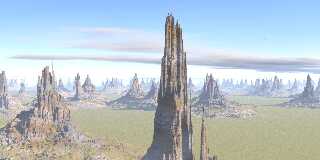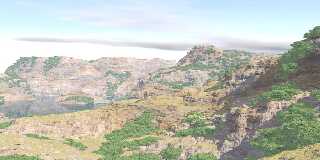 |
 |
|
 |
|
 |
|  |
|  |
|
 |
|
 |
|  |
|  |
|
 |
Experimenting with different utilities, This scene is a combination of:
1) strands.exe by Sam Benge
https://news.povray.org/povray.binaries.utilities/thread/%3Cweb.4c8d4d9b76e12d9dc003acd0%40news.povray.org%3E/?ttop=429399&toff=50
2) hf2iso by Jaime Vives Piqueres
http://www.ignorancia.org/index.php/technical/tools-objects/heightfield-based-isosurfaces/
which, over the years, I have gradually adapted to my needs without
changing the basic structure.
3) lightsys IV also by Jaime
http://www.ignorancia.org/en/index.php?page=Lightsys
--
Thomas
Post a reply to this message
Attachments:
Download 'jvp_hf2iso_02_4.jpg' (97 KB)
Preview of image 'jvp_hf2iso_02_4.jpg'

|
 |
|  |
|  |
|
 |
|
 |
|  |
|  |
|
 |
Thomas de Groot <tho### [at] degroot org> wrote:
> Experimenting with different utilities, This scene is a combination of:
>
> 1) strands.exe by Sam Benge
>
https://news.povray.org/povray.binaries.utilities/thread/%3Cweb.4c8d4d9b76e12d9dc003acd0%40news.povray.org%3E/?ttop=4
29399&toff=50
>
> 2) hf2iso by Jaime Vives Piqueres
>
http://www.ignorancia.org/index.php/technical/tools-objects/heightfield-based-isosurfaces/
> which, over the years, I have gradually adapted to my needs without
> changing the basic structure.
>
> 3) lightsys IV also by Jaime
> http://www.ignorancia.org/en/index.php?page=Lightsys
It looks good, Thomas. I had to look up inselbergs... It's a fitting
description.
I've always wanted to find a way to add overhangs cutting into the surfaces of
such structures, but no solution is easy. Even when using isosurfaces, the
function always extends upward and not outward. I've got an idea how overhangs
and grooves could be accomplished, but it is very expensive, time-wise.
Sam org> wrote:
> Experimenting with different utilities, This scene is a combination of:
>
> 1) strands.exe by Sam Benge
>
https://news.povray.org/povray.binaries.utilities/thread/%3Cweb.4c8d4d9b76e12d9dc003acd0%40news.povray.org%3E/?ttop=4
29399&toff=50
>
> 2) hf2iso by Jaime Vives Piqueres
>
http://www.ignorancia.org/index.php/technical/tools-objects/heightfield-based-isosurfaces/
> which, over the years, I have gradually adapted to my needs without
> changing the basic structure.
>
> 3) lightsys IV also by Jaime
> http://www.ignorancia.org/en/index.php?page=Lightsys
It looks good, Thomas. I had to look up inselbergs... It's a fitting
description.
I've always wanted to find a way to add overhangs cutting into the surfaces of
such structures, but no solution is easy. Even when using isosurfaces, the
function always extends upward and not outward. I've got an idea how overhangs
and grooves could be accomplished, but it is very expensive, time-wise.
Sam
Post a reply to this message
|
 |
|  |
|  |
|
 |
|
 |
|  |
|  |
|
 |
Op 05/12/2021 om 00:32 schreef Samuel B.:
> It looks good, Thomas. I had to look up inselbergs... It's a fitting
> description.
>
Thanks indeed Sam.
> I've always wanted to find a way to add overhangs cutting into the surfaces of
> such structures, but no solution is easy. Even when using isosurfaces, the
> function always extends upward and not outward. I've got an idea how overhangs
> and grooves could be accomplished, but it is very expensive, time-wise.
>
Jaime's hf2iso does a fair job on this by generating a slope map from
the image. It is relatively fast too to use. I do not have a good
example of the marked stratification it provides on this computer; I
shall post one later today.
The present scene does no really show the stratification for some reason
that I am investigating. It has to do I guess with the somewhat
exaggerated vertical scale left over from the strands image in the first
place. This might be somewhat corrected by a blurred image map. I shall
see how it goes.
--
Thomas
Post a reply to this message
|
 |
|  |
|  |
|
 |
|
 |
|  |
|  |
|
 |
As promised.
--
Thomas
Post a reply to this message
Attachments:
Download 'jvp_hf2iso_01_2c.jpg' (127 KB)
Preview of image 'jvp_hf2iso_01_2c.jpg'

|
 |
|  |
|  |
|
 |
|
 |
|  |
|  |
|
 |
Thomas de Groot <tho### [at] degroot org> wrote:
> As promised.
> (...)
Wow, the structure of the landscape is great. And the isosurface foliage looks
decent as well. Are you using radiosity for that, or fill lights? If not
radiosity, then there might be a way to make it work well in such a scene whilst
still keeping the render times acceptably low. (Basically: low count, low
error_bound, lowish aa settings and maybe some focal blur for extra samples.)
Anyway, you're managing to inspire me. Now all I need to do is stop being lazy
;)
Sam org> wrote:
> As promised.
> (...)
Wow, the structure of the landscape is great. And the isosurface foliage looks
decent as well. Are you using radiosity for that, or fill lights? If not
radiosity, then there might be a way to make it work well in such a scene whilst
still keeping the render times acceptably low. (Basically: low count, low
error_bound, lowish aa settings and maybe some focal blur for extra samples.)
Anyway, you're managing to inspire me. Now all I need to do is stop being lazy
;)
Sam
Post a reply to this message
|
 |
|  |
|  |
|
 |
|
 |
|  |
|  |
|
 |
Op 06/12/2021 om 00:51 schreef Samuel B.:
> Thomas de Groot <tho### [at] degroot org> wrote:
>> As promised.
>> (...)
>
> Wow, the structure of the landscape is great. And the isosurface foliage looks
> decent as well. Are you using radiosity for that, or fill lights? If not
> radiosity, then there might be a way to make it work well in such a scene whilst
> still keeping the render times acceptably low. (Basically: low count, low
> error_bound, lowish aa settings and maybe some focal blur for extra samples.)
>
All credit go to Jaime, including the vegetation.
This is not a radiosity render, just a sky with appropriate finish. I
started a radiosity render for one of those scenes and it is slow... I
have not yet tried all the settings to make it a bit faster; that is one
of the next batches of experimentation. The focal blur is a good
reminder; I had almost forgot it. A stochastic render otoh, would
probably slow the render even more in this case.
> Anyway, you're managing to inspire me. Now all I need to do is stop being lazy
> ;)
>
Excellent! :-)
--
Thomas org> wrote:
>> As promised.
>> (...)
>
> Wow, the structure of the landscape is great. And the isosurface foliage looks
> decent as well. Are you using radiosity for that, or fill lights? If not
> radiosity, then there might be a way to make it work well in such a scene whilst
> still keeping the render times acceptably low. (Basically: low count, low
> error_bound, lowish aa settings and maybe some focal blur for extra samples.)
>
All credit go to Jaime, including the vegetation.
This is not a radiosity render, just a sky with appropriate finish. I
started a radiosity render for one of those scenes and it is slow... I
have not yet tried all the settings to make it a bit faster; that is one
of the next batches of experimentation. The focal blur is a good
reminder; I had almost forgot it. A stochastic render otoh, would
probably slow the render even more in this case.
> Anyway, you're managing to inspire me. Now all I need to do is stop being lazy
> ;)
>
Excellent! :-)
--
Thomas
Post a reply to this message
|
 |
|  |
|  |
|
 |
|
 |
|  |
|  |
|
 |
Thomas de Groot <tho### [at] degroot org> wrote:
> As promised.
>
> --
> Thomas
Well done, Thomas. Now I'll have to dig out those utilities and start
experimenting as well.
Cheers
Ton org> wrote:
> As promised.
>
> --
> Thomas
Well done, Thomas. Now I'll have to dig out those utilities and start
experimenting as well.
Cheers
Ton
Post a reply to this message
|
 |
|  |
|  |
|
 |
|
 |
|  |
|  |
|
 |
Op 07/12/2021 om 00:00 schreef Ton:
> Thomas de Groot <tho### [at] degroot org> wrote:
>> As promised.
>>
>> --
>> Thomas
>
> Well done, Thomas. Now I'll have to dig out those utilities and start
> experimenting as well.
>
> Cheers
> Ton
>
>
Thanks indeed Ton. As I wrote to Sam, all credit to Jaime. Over the
years, I have made small changes/improvements to his code as I saw fit,
or adapted to my own needs. Most are of no real consequence, a few
increased render speed a bit (e.g. the 'trees').
--
Thomas org> wrote:
>> As promised.
>>
>> --
>> Thomas
>
> Well done, Thomas. Now I'll have to dig out those utilities and start
> experimenting as well.
>
> Cheers
> Ton
>
>
Thanks indeed Ton. As I wrote to Sam, all credit to Jaime. Over the
years, I have made small changes/improvements to his code as I saw fit,
or adapted to my own needs. Most are of no real consequence, a few
increased render speed a bit (e.g. the 'trees').
--
Thomas
Post a reply to this message
|
 |
|  |
|  |
|
 |
|
 |
|  |




![]()